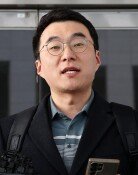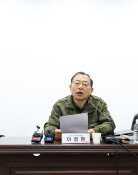Vanguards of Reunification
The number of North Korean defectors who risked their lives to settle in South Korea is an estimated 20,000. They are witnesses to the oppression of the Norths communist regime and famine in the Stalinist country. Since the average defector is known to have 10 relatives in the North, at least 200,000 North Koreans are under the influence of defectors in the South. This means that most North Koreans will learn sooner or later that their governments propaganda is a lie, however hard Pyongyang sets up barriers to the outside world.
Defectors are messengers who tell of South Koreas advanced society and make North Koreans understand that they reside in a living hell through communication with their relatives in the North. If the number of defectors increases to 200,000, the North Korean government will become hard to stand. Defector Lee Min-bok is sending flyers in balloons to deliver news to the North from the South and expose the crimes of the communist regime. Communication between both Koreas via defectors is an important stepping stone toward eventual reunification.
When Germany was divided, East Germans learned that West Germany was ahead and East Germany was behind through people-to-people and communication exchanges with West Germans. The trigger that led to the collapse of the Berlin Wall was the public opinion of East Germans aspiring for change. The sudden collapse of East Germany attests to its governments failure to stop such enormous pressure. Yet it is hard to expect the North Korean government, which continues nuclear development and three generations of power succession while driving its people into poverty and famine, to change by itself. Dramatic change will happen only when North Koreans have one voice. In that regard, North Korean defectors can serve as vanguards that can trigger change in the North.
Certain defectors have settled down in South Korea but many barely make ends meet. Only 41.9 percent of defectors are employed, far lower than 59.3 percent for South Koreans. In addition, discrimination against defectors by the South Korean people and companies is also making it more difficult for defectors to find work. Everyone must be open-minded to accept defectors as their neighbors.
Seoul must also shift its policy from passive measures such as providing financial support for the resettlement of defectors to a more active policy of encouraging them to serve as a group preparing for reunification. Ahn Chan-il, head of the World Institute for North Korean Studies and a defector himself, said, Since North Korean defectors have experienced life in both Koreas, they can play a big role in the social integration process after unification. German Chancellor Angela Merkel also hailed from East Germany, so South Korea needs to foster talent among defectors who can contribute to a reunified Korea.







